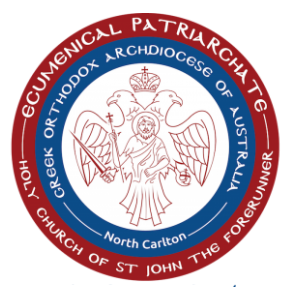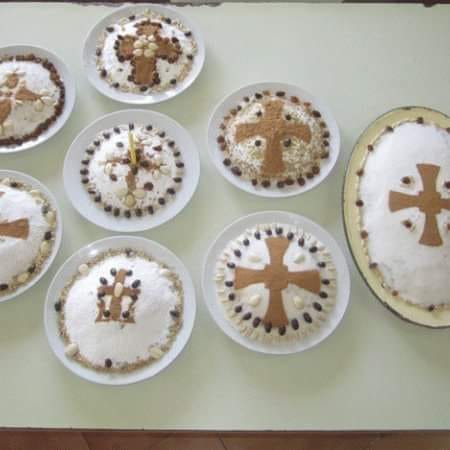Next Three Saturdays
This Saturday is know as Saturday of Souls
Traditionally the Orthodox remember the dead on a Saturday, the day Christ lay in his tomb. The Orthodox believe that it is the duty of the living to remember and pray for the deceased. A general prayer is said for specific individuals and all unknown souls who have no one to pray for them. Parishioners are required to bring a small dish of Kollyva to the Church and submit a list of first names of deceased loved ones so we can commemorate them at the end of the service.
Please make sure that the names are their baptisim name and clearly written
Receipt and meaning of Koliva here it is:
Recipe for Koliva – Saturday of souls
Koliva is made for funeral and memorial services and distributed to those in attendance. Koliva is made primarily of wheat, which is symbolic of life and regeneration. Like wheat, people are buried in order to grow and have a new life.
(Koliva) Recipe Ingredients:
• 4 cups wheat grain, shelled
• 1 1/2 cups walnuts, coarsely chopped
• 1 1/2 cups blanched almonds, lightly toasted
• 3/4 cup golden raisins
• 2 cups finely ground Zweiback, graham crackers, or paximadia
• 2 cups powdered sugar
• .5 tablespoon cinnamon
• 1/2 cup sesame seeds lightly toasted
• 1/2 cup pomegranate seeds (optional)
• Almonds, powdered sugar, silver candies, walnuts or white raisins for decoration (optional)
How to Make Koliva:
Wash the wheat thoroughly to get rid of any grit or sand. Add the wheat to a large pot. Fill the pot with water, add a few pinches of salt, and bring the water to a boil.
Cook the wheat until it’s fluffy and tender – this should take about 20 minutes.
Strain the wheat and let the water drain out thoroughly.
Prepare a surface by layering some towels down. Spread the wheat thinly on the towels and allow drying overnight.
Add the wheat, walnuts, almonds, raisins, sesame seeds, pomegranate seeds and 2 tablespoons of the ground toast/crackers to a large mixing bowl and stir well with a wooden spoon until all the ingredients are evenly distributed.
Place the mixture in a tray or bowl that you would like to use. Press the mixture down to smooth it out and shape it (mound for tray or flat for bowl). Sprinkle some of the remaining toast/crackers on the top of the mixture to cover (no need to use all the crackers).
Sprinkle the powdered sugar generously on top.
Decorate the top with any of the ingredients you choose. It is traditional to adorn the top with a cross.
The Significance of Koliva in the Greek Orthodox Church
Koliva is boiled wheat with (depending on the recipe) a combination of some or all of the following ingredients: powdered sugar, almonds, ground walnuts, sesame seeds, cinnamon, pomegranate seeds, raisins, anise, parsley and more. Koliva is made for memorials, typically on Saturdays of the Souls, and according to different traditions, the day of a Funeral, the 40th day after death, 3rd month, 6th month, 9th month, annually, and even sometimes just on “big” anniversaries only, such as 5 years, 10 years, etc. Though I have never seen the funeral day Koliva, I have heard that it has no sweetness added, so it is very bitter, somewhat fitting for the funeral, and then sweetness is added beginning with the 40th day.
In John’s Gospel we find this quote, “Christ said, ‘Unless a wheat grain falls into the earth and dies, it remains alone; but if it dies, it bears much fruit.’” (John 12:24) As Orthodox Christians we are awaiting the 2nd Coming and the General Resurrection of the dead, through Christ we have Life! But, remembering the memory of our deceased beloved ones is an opportunity to pray for the souls of the departed as well as a way to help us heal from the death.
Koliva is an important part for the beginning of Lent. The first Saturday of Lent and the previous two Saturdays leading up to it are called the Saturdays of the Souls. Saturday, year round, is a remembrance of the dead, but these particular Saturdays the remembrance is intensified. According to tradition, Koliva is connected to Lent because of a miracle from St. Theodore the Tyro. In the 4th Century AD, Emperor Julian the Apostate knew that Christians would be hungry after the first week of strict fasting, which would make them go to the markets in Constantinople to buy food. Emperor Julian ordered blood from pagan sacrifices to be sprinkled on the food that was sold there, trying to force the Christians to paganism. St. Theodore the Tyro, who had died in the early 300’s, appeared to the Patriarch of Constantinople, Eudoxios, in a dream, telling him that Christians should just boil wheat from their homes and sweeten it with honey, to avoid the polluted foods at the market.
The process of boiling the wheat takes a long time, as well as drying the wheat after it is boiled to the right doneness, so making koliva is not something that is quick and painless, but rather takes your time and attention. I urge families to try to make their own koliva for the next family memorial and to remember and pray for the ones for whom the koliva is being prepared

